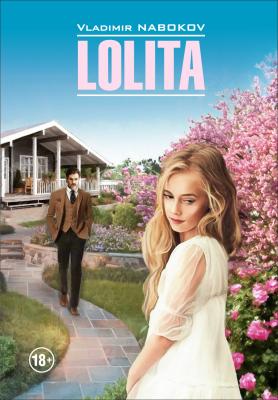ТОП просматриваемых книг сайта:
Lolita / Лолита. Книга для чтения на английском языке. Владимир Набоков
Читать онлайн.Название Lolita / Лолита. Книга для чтения на английском языке
Год выпуска 1955
isbn 978-5-9925-1402-5
Автор произведения Владимир Набоков
Жанр Русская классика
Серия Modern Prose
Издательство КАРО
Pym, Roland. Born in Lundy, Mass., 1922. Received stage training at Elsinore Playhouse, Derby, N.Y. Made debut in Sunburst. Among his many appearances are Two Blocks from Here, The Girl in Green, Scrambled Husbands, The Strange Mushroom, Touch and Go, John Lovely, I Was Dreaming of You.
Quilty, Clare, American dramatist. Born in Ocean City, N.J., 1911. Educated at Columbia University. Started on a commercial career but turned to playwriting. Author of The Little Nymph, The Lady who Loved Lightning (in collaboration with Vivian Darkbloom), Dark Age, The Strange Mushroom, Fatherly Love, and others. His many plays for children are notable. Little Nymph (1940) travelled 14,000 miles and played 280 performances on the road during the winter before ending in New York. Hobbies: fast cars, photography, pets.
Quine, Dolores. Born in 1882, in Dayton, Ohio. Studied for stage at American Academy. First played in Ottawa in 1900. Made New York debut in 1904 in Never Talk to Strangers. Has disappeared since in [a list of some thirty plays follows].
How the look of my dear love’s name, even affixed to some old hag of an actress, still makes me rock with helpless pain! Perhaps, she might have been an actress too. Born 1935. Appeared (I notice the slip of my pen in the preceding paragraph, but please do not correct it, Clarence) in The Murdered Playwright. Quine the Swine. Guilty of killing Quilty. Oh, my Lolita, I have only words to play with!
9
Divorce proceedings delayed my voyage, and the gloom of yet another World War had settled upon the globe when, after a winter of ennui and pneumonia in Portugal, I at last reached the States. In New York I eagerly accepted the soft job fate offered me: it consisted mainly of thinking up and editing perfume ads.
I welcomed its desultory character and pseudo-literary aspects, attending to it whenever I had nothing better to do. On the other hand, I was urged by a wartime university in New York to complete my comparative history of French literature for English-speaking students. The first volume took me a couple of years during which I put in seldom less than fifteen hours of work daily. As I look back on those days, I see them divided tidily into ample light and narrow shade: the light pertaining to the solace of research in palatial libraries, the shade to my excruciating desires and insomnias of which enough has been said. Knowing me by now, the reader can easily imagine how dusty and hot I got, trying to catch a glimpse of nymphets (alas, always remote) playing in Central Park, and how repulsed I was by the glitter of deodorized career girls that a gay dog in one of the offices kept unloading upon me. Let us skip all that. A dreadful breakdown sent me to a sanatorium for more than a year; I went back to my work – only to be hospitalized again.
Robust outdoor life seemed to promise me some relief. One of my favourite doctors, a charming cynical chap with a little brown beard, had a brother, and this brother was about to lead an expedition into arctic Canada. I was attached to it as a ‘recorder of psychic reactions’. With two young botanists and an old carpenter I shared now and then (never very successfully) the favours of one of our nutritionists, a Dr. Anita Johnson – who was soon flown back, I am glad to say. I had little notion of what object the expedition was pursuing. Judging by the number of meteorologists upon it, we may have been tracking to its lair (somewhere on Prince of Wales’ Island, I understand) the wandering and wobbly north magnetic pole. One group, jointly with the Canadians, established a weather station on Pierre Point in Melville Sound. Another group, equally misguided, collected plankton. A third studied tuberculosis in the tundra. Bert, a film photographer – an insecure fellow with whom at one time I was made to partake in a good deal of menial work (he, too, had some psychic troubles) – maintained that the big men on our team, the real leaders we never saw, were mainly engaged in checking the influence of climatic amelioration on the coats of the arctic fox.
We lived in prefabricated timber cabins amid a Pre-Cambrian world of granite. We had heaps of supplies – the Reader’s Digest, an ice-cream mixer, chemical toilets, paper hats for Christmas. My health improved wonderfully in spite or because of all the fantastic blankness and boredom. Surrounded by such dejected vegetation as willow scrub and lichens; permeated, and, I suppose, cleansed by a whistling gale; seated on a boulder under a completely translucent sky (through which, however, nothing of importance showed), I felt curiously aloof from my own self. No temptations maddened me. The plump, glossy little Eskimo girls with their fish smell, hideous raven hair and guinea pig faces, evoked even less desire in me than Dr. Johnson had. Nymphets do not occur in polar regions.
I
le gredin
may have spared me a bloody nose – вероятно, спасла меня от разбитого в кровь носа
née – (фр.) урожденная
eclecticism – эклектизм (философское учение, основанное на сочетании положений, заимствованных из разнообразных философских систем)

